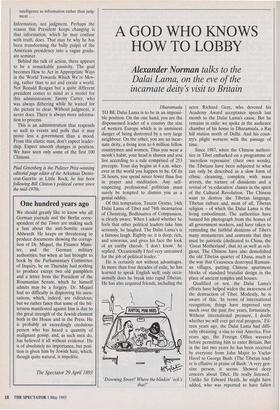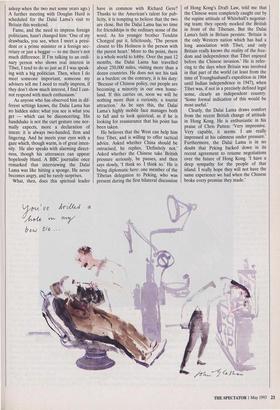A GOD WHO KNOWS HOW TO LOBBY
Alexander Norman talks to the Dalai Lama, on the eve of the incarnate deity's visit to Britain
Of this temptation, Tenzin Gyatso, 14th Dalai Lama of Tibet and 74th incarnation of Chenrezig, Bodhisattva of Compassion, is clearly aware. When I asked whether he feels that other political leaders take him seriously, he laughed. The Dalai Lama's is a famous laugh. Rightly so: it is deep, rich, and sonorous, and gives his face the look of an earthy cherub. 'I don't know,' he replied. 'Occasionally I feel very untrained for the job of political leader. '
He is certainly not without advantages. In more than four decades of exile, he has learned to speak English well; only occa- sionally does he break into rapid Tibetan. He has also acquired friends, including the
`Downing Street? Where the blinkin"eck's that?'
actor Richard Gere, who devoted his Academy Award acceptance speech last month to the Dalai Lama's cause. But he remains in exile: we spoke in the audience chamber of his home in Dharamsala, a Raj hill station north of Delhi. And his coun- try's plight worsens with the passage of time.
Since 1987, when the Chinese authori- ties in Tibet embarked on a programme of `merciless repression' (their own words), the Tibetans have been subjected to what can only be described as a slow form of ethnic cleansing, complete with mass arrests, the torture of dissidents and a revival of 're-education' classes in the spirit of the Cultural Revolution. The Chinese want to destroy the Tibetan language, Tibetan culture and, most of all, Tibetan religion — of which the Dalai Lama is the living embodiment. The authorities have banned his photograph from the homes of all government workers, and have taken to reminding the faithful denizens of Tibet's many monasteries and convents that they must be patriotic (dedicated to China, the `Great Motherland', that is) as well as reli- gious. The Chinese have also demolished the old Tibetan quarter of Lhasa, much in the way that Ceausescu destroyed Rumani- an villages, putting Chinese apartment blocks of standard brutalist design in the place of ancient temples and houses.
Qualified or not, the Dalai Lama's efforts have helped widen the awareness of the destruction of Tibet. Modestly, he is aware of this: 'In terms of international recognition, things have improved very much over the past five years, fortunately. Without international pressure, I doubt whether we will ever get real progress.' Fif- teen years ago, the Dalai Lama had diffi- culty obtaining a visa to visit America. Five years ago, the Foreign Office wavered before permitting him to enter Britain. But in the last two years he has been received by everyone from John Major to Vaclav Havel to George Bush. (The Tibetan lead- er is effusive in praise of Bush: 'A very gen- uine person, it seems. Showed deep concern about Tibet. He really listened.' Unlike Sir Edward Heath, he might have added, who was reported to have fallen asleep when the two met some years ago.) A further meeting with Douglas Hurd is scheduled for the Dalai Lama's visit to Britain this weekend.
Fame, and the need to impress foreign politicians, hasn't changed him: 'One of my drawbacks, you see, when I meet a presi- dent or a prime minister or a foreign sec- retary or just a beggar — to me there's not much difference. If I'm talking to an ordi- nary person who shows real interest in Tibet, I tend to do so just as if I was speak- ing with a big politician. Then, when I do meet someone important, someone my advisers tell me I need to really impress, if they don't show much interest, I find I can- not respond with much enthusiasm.'
As anyone who has observed him in dif- ferent settings knows, the Dalai Lama has no hidden sides: what you see is what you get — which can be disconcerting. His handshake is not the curt gesture one nor- mally expects, more a declaration of intent: it is always two-handed, firm and lingering. And he meets your eyes with a gaze which, though warm, is of great inten- sity. He also speaks with alarming direct- ness, though his utterances can appear hopelessly bland. A BBC journalist once remarked that interviewing the Dalai Lama was like hitting a sponge. He never becomes angry, and he rarely surprises.
What, then, does this spiritual leader have in common with Richard Gere? Thanks to the American's talent for pub- licity, it is tempting to believe that the two are close. But the Dalai Lama has no time for friendships in the ordinary sense of the word. As his younger brother Tendzin Choegyal put it, felicitously, The person closest to His Holiness is the person with the purest heart.' More to the point, there is a whole world to lobby. Over the past 12 months, the Dalai Lama has travelled about 250,000 miles, visiting more than a dozen countries. He does not see his task as a burden; on the contrary, it is his duty: `Because of Chinese policy, our people are becoming a minority in our own home- land. If this carries on, soon we will be nothing more than a curiosity, a tourist attraction.' As he says this, the Dalai Lama's highly mobile face manages both to fall and to look quizzical, as if he is looking for reassurance that his point has been taken.
He believes that the West can help him free Tibet, and is willing to offer tactical advice. Asked whether China should be ostracised, he replies, 'Definitely not.' Asked whether the Chinese take British pressure seriously, he pauses, and then says slowly, 'I think so. I think so.' He is being diplomatic here: one member of the Tibetan delegation to Peking, who was present during the first bilateral discussion of Hong Kong's Draft Law, told me that the Chinese were completely caught out by the supine attitude of Whitehall's negotiat- ing team; they openly mocked the British in front of the Tibetans. But the Dalai Lama's faith in Britain persists: 'Britain is the only Western nation which has had a long association with Tibet, and only Britain really knows the reality of the free- dom and independence that Tibet enjoyed before the Chinese invasion.' He is refer- ring to the days when Britain was involved in that part of the world (at least from the time of Younghusband's expedition in 1904 until Indian independence in 1947), when Tibet was, if not in a precisely defined legal sense, clearly an independent country. `Some formal indication of this would be most useful.'
Clearly, the Dalai Lama draws comfort from the recent British change of attitude in Hong Kong. He is enthusiastic in his praise of Chris Patten: 'Very impressive. Very capable, it seems. I am really impressed at his calmness under pressure.' Furthermore, the Dalai Lama is in no doubt that Peking backed down in its recent agreement to resume negotiations over the future of Hong Kong. 'I have a deep sympathy for the people of that island. I really hope they will not have the same experience we had when the Chinese broke every promise they made.'



























































 Previous page
Previous page